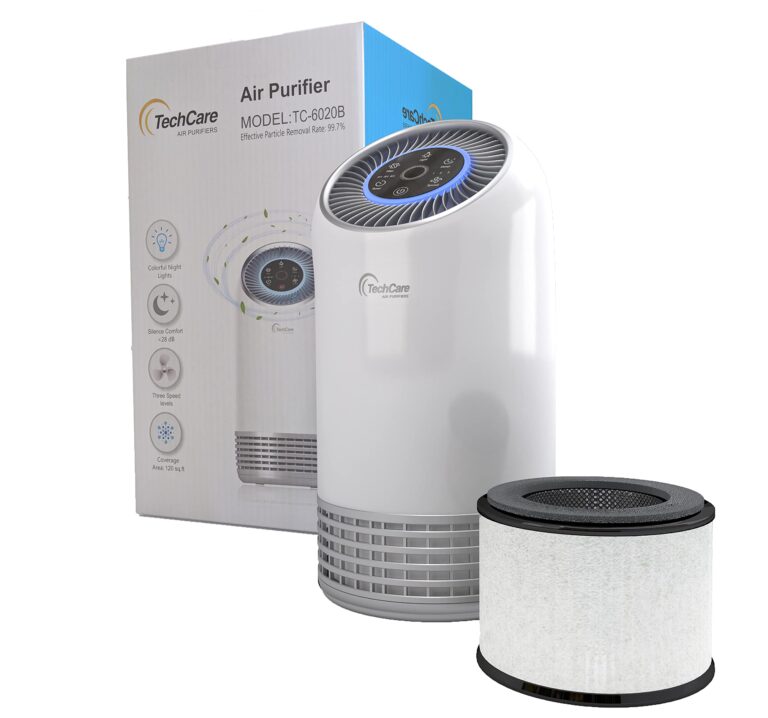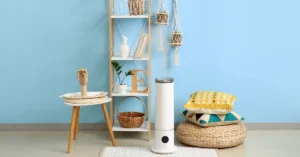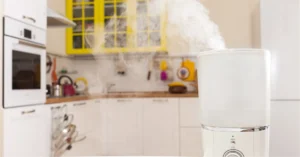Yes, an air purifier can help with congestion by removing allergens and irritants from the air, allowing for easier breathing and reducing nasal congestion. Congestion can be a bothersome symptom, causing discomfort and difficulty in everyday activities.
Whether it’s due to allergies, respiratory infections, or simply a stuffy nose, finding relief is crucial for overall well-being. An air purifier can play a significant role in easing congestion by eliminating common triggers such as pollen, pet dander, dust mites, and mold spores from the air.
This improves air quality and helps minimize congestion symptoms, allowing individuals to breathe easier and enjoy better respiratory health. With the right air purifier, you can create a clean and healthy indoor environment, free from congestion and its associated discomforts.
The Connection Between Air Quality And Congestion
Indoor air quality plays a significant role in congestion and respiratory health. When it comes to congestion, common causes include allergies, sinus infections, and colds. These conditions can be exacerbated by indoor air pollutants such as dust, pet dander, mold, and cigarette smoke. Poor air quality can irritate the nasal passages and lead to inflammation, resulting in congestion.
Air purifiers help reduce congestion by filtering out these indoor air pollutants. They are designed to capture and remove allergens and other airborne particles, improving the overall indoor air quality. By removing these pollutants from the air, air purifiers can alleviate congestion and provide relief to individuals suffering from respiratory issues.
In addition to reducing congestion, air purifiers also provide other health benefits. They can help alleviate symptoms of asthma and allergies, improve sleep quality, and reduce the risk of respiratory infections.
Understanding Air Purifiers For Congestion Relief
In the quest for better air quality and relief from congestion, air purifiers have gained popularity as an effective solution. These devices work by removing pollutants and allergens from the air, helping individuals breathe easier and reducing congestion symptoms.
There are several types of air purifiers available, each with its effectiveness in alleviating congestion. HEPA purifiers are renowned for their high filtration efficiency, capturing particles as small as 0.3 microns. Activated carbon filters are particularly effective in removing odors and chemicals, often contributing to congestion. Ionic purifiers release negative ions, which attach to positively charged particles and settle them down.
| Type of Air Purifier | Effectiveness |
|---|---|
| HEPA | Highly effective in removing airborne particles |
| Activated Carbon | Great for eliminating odors and chemicals |
| Ionic | Effective in settling charged particles |
When choosing an air purifier for congestion relief, it’s important to consider key features. Look for devices with multiple filtration stages, as they can tackle a range of contaminants. CADR (Clean Air Delivery Rate) is a useful metric to assess the purifier’s efficiency. Additionally, consider the room size coverage and noise levels to ensure a suitable fit for your needs.
With the right air purifier, you can combat congestion and breathe cleaner air. Consider your specific requirements and explore the different options available to find the most suitable solution.
Benefits Of Using Air Purifiers For Congestion Relief
The use of air purifiers can be beneficial in relieving congestion caused by allergens and pollutants. These devices work by filtering out airborne particles that can irritate the sinuses and nasal passages, leading to congestion and discomfort.
By reducing the presence of allergens such as dust mites, pollen, pet dander, and mold spores, air purifiers can help alleviate sinus and nasal congestion. The purified air promotes easier breathing, allowing you to breathe more comfortably and without obstruction.
In addition to reducing allergens, air purifiers also help remove other pollutants from the air, such as smoke, odors, and chemicals. These substances can further aggravate congestion and respiratory issues, so their removal can provide relief.
Another benefit of using air purifiers is their ability to promote better sleep. Congestion can make it difficult to sleep peacefully, leading to interruptions and reduced sleep quality. With cleaner air, you may experience improved sleep, allowing your body to rest and recover properly.
In conclusion, air purifiers can be a valuable tool in providing relief from congestion caused by allergens and pollutants. By reducing airborne irritants, promoting easier breathing, and enhancing sleep quality, these devices can help improve your overall respiratory health.
Air Purifiers Vs. Other Methods For Congestion Relief
An air purifier can be an effective tool for helping with congestion, but it is important to understand its limitations and consider other methods for relief as well. Air purifiers are designed to remove allergens, pollutants, and irritants from the air, which can help reduce congestion caused by allergies or respiratory issues. However, they may not be as effective for congestion caused by other factors such as colds or sinus infections.
It is important to note that air purifiers are not a cure-all solution and should be used in conjunction with other strategies for congestion relief. Combining the use of an air purifier with complementary strategies such as nasal rinses, steam inhalation, or over-the-counter medications can provide optimal results. These methods can help clear nasal passages, reduce inflammation, and alleviate congestion.
When considering whether an air purifier is right for you, it is important to assess the source of your congestion and consult with a healthcare professional if needed. They can provide guidance on the most suitable methods and treatment options for your specific condition.
Understanding How To Use Air Purifiers For Congestion Relief
Whether you are suffering from allergies, a common cold, or sinus congestion, an air purifier can provide much-needed relief. By filtering out allergens and pollutants, air purifiers help promote better air quality in your home or office environment. To maximize its benefits, proper placement and positioning of the air purifier are crucial. Strategic positioning in areas where you spend the most time can help ensure that you are breathing in the cleanest air. Additionally, regular maintenance and cleaning of the air purifier are essential for optimal performance. This includes cleaning or replacing the filters as recommended by the manufacturer. Following the usage guidelines provided by the manufacturer is important for effective congestion relief. It is also advisable to keep doors and windows closed while using the air purifier to prevent external pollutants from entering the indoor space. By incorporating an air purifier into your daily routine, you can enjoy improved air quality and potentially find relief from congestion.

Credit: www.livemint.com
How To Choose The Right Air Purifier For Your Needs
When choosing an air purifier for congestion relief, it’s important to identify your specific needs and concerns. Start by determining the severity of your congestion and any accompanying symptoms, such as allergies or respiratory issues. Next, consider key features that can effectively target congestion, like a HEPA filter to remove allergens and irritants from the air.
Additionally, take into account your budget and the size of the room where the air purifier will be used. A larger room may require a purifier with higher coverage area, while a smaller budget may limit your options. Compare different brands and models to find one that suits your needs and fits within your budget.
| Key Features to Consider | Explanation |
|---|---|
| HEPA filter | A high-efficiency particulate air filter that can trap small particles and allergens. |
| Activated carbon filter | Effective in removing odors and chemicals from the air. |
| Size and coverage area | Choose a purifier that can adequately clean the air in the room where it will be used. |
| Noise level | Consider the noise level of the purifier, especially if it will be used in bedrooms or quiet areas. |
| Additional features | Some air purifiers offer features like air quality sensors, timers, or remote controls. |
Frequently Asked Questions On Does An Air Purifier Help With Congestion
Is An Air Purifier Or Humidifier Better For Congestion?
An air purifier is better for congestion as it filters out airborne pollutants that can worsen congestion symptoms. A humidifier adds moisture to the air, which can relieve dryness but may not specifically help with congestion.
Are Purifiers Good For Stuffy Nose?
Yes, purifiers can help with a stuffy nose by removing allergens, dust, and pollutants from the air. They improve air quality, making it easier to breathe and reducing nasal congestion.
Do Air Purifiers Help With Getting Sick?
Yes, air purifiers can help prevent getting sick by removing airborne particles and allergens. They improve indoor air quality, reducing the risk of respiratory issues and allergies.
Does Using An Air Purifier Help With Congestion?
Using an air purifier can help with congestion by filtering out airborne pollutants and improving indoor air quality. It can remove allergens, dust, and other particles that irritate the nasal passages, reducing congestion symptoms. However, it is important to keep in mind that an air purifier should be used in conjunction with other measures to effectively manage congestion.
Conclusion
An air purifier can be an effective tool in helping to alleviate congestion. By filtering out pollutants and allergens from the air, it reduces the irritants that can exacerbate nasal congestion and other respiratory symptoms. However, it is important to understand that an air purifier is just one piece of the puzzle.
Maintaining good indoor air quality, practicing proper hygiene, and seeking medical advice are also crucial for managing congestion effectively. Remember, the ultimate goal is to create a healthy and comfortable living environment for optimal well-being.




